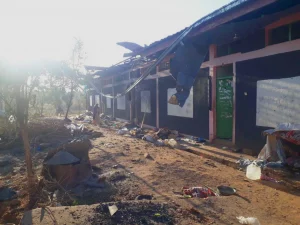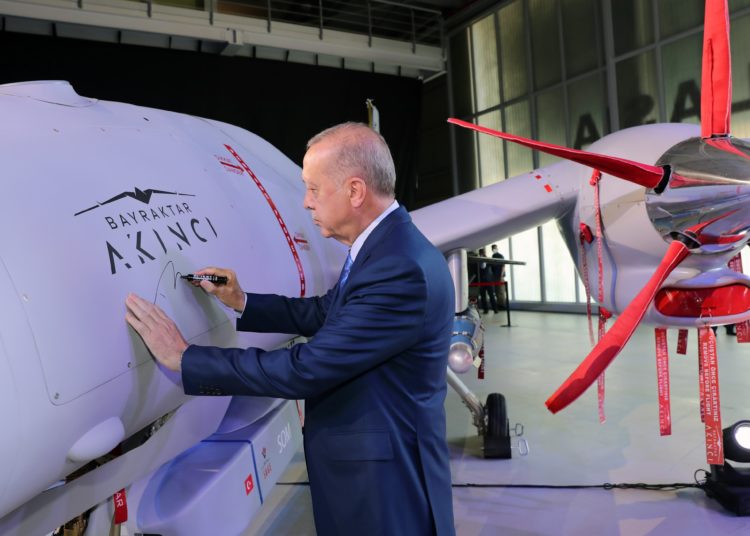Abdullah Bozkurt/Stockholm
A high-ranking Turkish government official has acknowledged that Turkey granted permission for Ethiopia to deploy Turkish-manufactured armed drones, which have been used in attacks resulting in the death of numerous civilians, including children.
Records from a closed-door parliamentary committee meeting on July 10 reveal that Maj. Gen. Hüseyin Duman, director general of technical services at the Ministry of Defense, disclosed that various agencies and ministries had collectively approved granting the Ethiopian military permission to deploy armed drones in domestic conflicts. This deployment has led to significant casualties in the African nation.
Duman confirmed that the Presidency of the Defense Industry (SSB), Turkey’s primary arms procurement agency directly accountable to President Recep Tayyip Erdogan, authorized both the sale and the deployment of the drones. This decision was also endorsed by the Ministry of Foreign Affairs and the General Staff.
The meeting, convened by the Turkish Parliament’s Foreign Affairs Committee, involved a debate among lawmakers regarding the procedures and compliance associated with the export of Turkish arms, including drones. Discussions also focused on the potential repercussions for Turkey stemming from the controversial use of these arms by recipient parties. During the hearing, senior officials from the military, the SSB and the Ministry of Foreign Affairs were questioned.
Excerpts from the Turkish Parliament’s Foreign Affairs Committee debate on the sale of Turkish arms abroad:
One lawmaker expressed concern about the fallout from the use of a Bayraktar TB2 drone in an attack carried out by the Ethiopian army on January 7, 2022. The attack targeted a primary school filled with women, children and elderly men, resulting in the death of at least 59 civilians and injuring dozens more.
Multiple investigative reports have concluded that the remnants of weapons recovered from the site were identified as MAM-L (smart micro munition) guided bombs, produced by Turkey’s state-owned arms manufacturer Roketsan. These munitions are exclusively paired with Bayraktar drones.
In response to the lawmaker’s question, Duman confirmed that the necessary authorizations had been granted to the Ethiopian army for use of the drones.
The sale of Turkish arms is governed by Law No. 5201, which outlines the regulations for the control of weapons and ammunition by Turkish authorities. This law confers authority on the Ministry of Defense, which established implementing regulations in 2007.

The law explicitly references Turkey’s adherence to the Missile Technology Control Regime (MTCR), an intergovernmental initiative aimed at curbing the proliferation of missiles and missile technology. It also acknowledges compliance with the Wassenaar Arrangement, another intergovernmental framework designed to enhance international security and stability by promoting transparency and responsibility in the transfer of conventional arms and dual-use goods and technologies. Turkey is a member of both organizations.
The end-user agreement required by Turkey and which precedes any sale of drones to Ethiopia has not been made public. There is no available information regarding whether Turkey included provisions and safeguard mechanisms in the agreement to prevent the Ethiopian army from using these weapons in human rights violations.
According to Mustafa Murat Şeker, deputy chairman of the SSB, who was also questioned during the committee hearing, Turkey has implemented various measures to track and monitor the use of its exported weapons. These measures include built-in spyware, GPS tracking, on-site inspections and remote camera monitoring.
Citing the sensitivity of the issue, Şeker did not provide details on the monitoring of Turkish drones used by foreign armies. He did not specify whether there was any tracking of how Ethiopia deployed Bayraktar drones in domestic conflicts that resulted in mass civilian casualties.
However, Duman explained that Turkey has developed countermeasures to address violations of the end-user agreement. These measures include the suspension of export permits for the violating party, which serves as a significant incentive to deter breaches of the agreement. Since the receiving state would remain dependent on Turkey for spare parts, maintenance and operation even after the sale, it theoretically has a vested interest in ensuring compliance.

Since no such countermeasures have ever been invoked against Ethiopia and no sanctions have been imposed despite credible reports of Turkish drones being used in human rights violations, Turkey clearly remains complicit in the abuses perpetrated by the Ethiopian army in the civil conflict.
Ethiopia is accused of committing serious human rights violations and war crimes in the bloody civil conflict with Tigray militia members between 2020 and 2022 by the United Nations and European Union as well as human rights organizations. Hundreds of thousands were killed in the civil war.
Turkish officials have previously denied any responsibility for cases in which Turkish arms might have contributed to increased instability or deadly attacks. “If a country buys them [drones] from us, they are no longer Turkish,” then-foreign minister Mevlüt Çavuşoğlu told reporters at the G20 summit in Rome in November 2021.
In response to a lawmaker’s written parliamentary question about the use of Turkish arms abroad by foreign countries and the potential backlash, legal issues and sanctions against Turkey, Turkish Defense Minister Yaşar Güler said on July 19 that the government adheres to relevant Turkish laws when transferring arms abroad.
Turkish Defense Minister Yaşar Güler’s response to parliamentary questions regarding the use of Turkish arms in foreign conflicts and the potential repercussions from such use:
He did not address the lawmaker’s specific questions or provide details on how compliance and monitoring are conducted, nor did he clarify whether Turkey ensures that end-user agreements are effectively implemented.
Since the drone sales, Turkey and Ethiopia have significantly increased their military and defense cooperation. On August 18, 2021 the two countries signed a comprehensive military framework agreement that included the sale of arms, intelligence sharing, combat training for Ethiopian troops and joint military exercises.
Bayraktar drones are manufactured by defense contractor Baykar, which is owned by Selçuk Bayraktar, the son-in-law of Turkish President Erdogan and a billionaire due to significant government support. The Turkish president frequently advocates for the sale of these drones during visits to foreign countries, particularly in Africa, often without sufficient consideration of human rights concerns.













